SSDI Anxiety: Does Anxiety Qualify for Disability Benefits?
- Last Updated: June 12th, 2025

Attorney Jessica Paluch-Hoerman, founder of TruLaw, has over 28 years of experience as a personal injury and mass tort attorney, and previously worked as an international tax attorney at Deloitte. Jessie collaborates with attorneys nationwide — enabling her to share reliable, up-to-date legal information with our readers.
Legally Reviewed
This article has been written and reviewed for legal accuracy and clarity by the team of writers and legal experts at TruLaw and is as accurate as possible. This content should not be taken as legal advice from an attorney. If you would like to learn more about our owner and experienced injury lawyer, Jessie Paluch, you can do so here.
Fact-Checked
TruLaw does everything possible to make sure the information in this article is up to date and accurate. If you need specific legal advice about your case, contact us by using the chat on the bottom of this page. This article should not be taken as advice from an attorney.
Key takeaways:
- Anxiety disorders can be severe enough for SSDI benefits if they impact work ability.
- Veterans with service-connected anxiety might also qualify for disability support.
- Appeals are possible if initial SSDI applications for anxiety are denied.
Overview of SSDI Anxiety Benefits
Question: Do I qualify for SSDI anxiety benefits?
Answer: Yes, in certain circumstances, anxiety could qualify for Social Security Disability Insurance (SSDI) benefits.
The Social Security Administration (SSA) considers anxiety a disability, particularly if it causes ongoing, severe symptoms that impede a person’s ability to care for themselves or fulfill job-related tasks.
On this page, we’ll discuss this question in further depth, an overview of SSDI anxiety benefits, qualifying for disability benefits with anxiety, and much more.
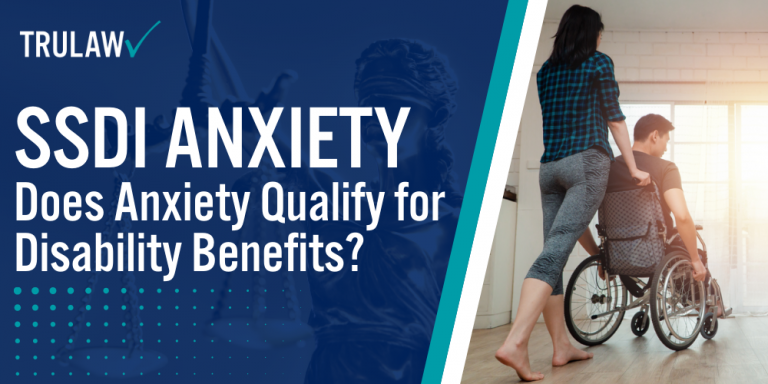
SSDI Anxiety Disorders: Evaluation Process
The SSA uses specific medical and functional criteria to evaluate whether an individual with anxiety qualifies for disability benefits.
Criteria for evaluating anxiety disorders include:
- Extreme limitation in one, or marked limitation in two areas of mental functioning.
- The anxiety disorder must be serious and persistent, supported by a documented history of ongoing medical treatment and support
- Objective medical evidence, reported symptoms, medical history, and observations of the individual’s functioning.
If you or a loved one are filing an SSDI application or appeal, contact TruLaw today using the chat on this page to receive an instant case evaluation.
Discover how the SSDI Lawyers within TruLaw’s legal network can help you today.
Table of Contents
Overview of SSDI Anxiety Disorder
Anxiety disorders encompass a range of mental health conditions that can be debilitating, impacting an individual’s ability to function in day-to-day life.
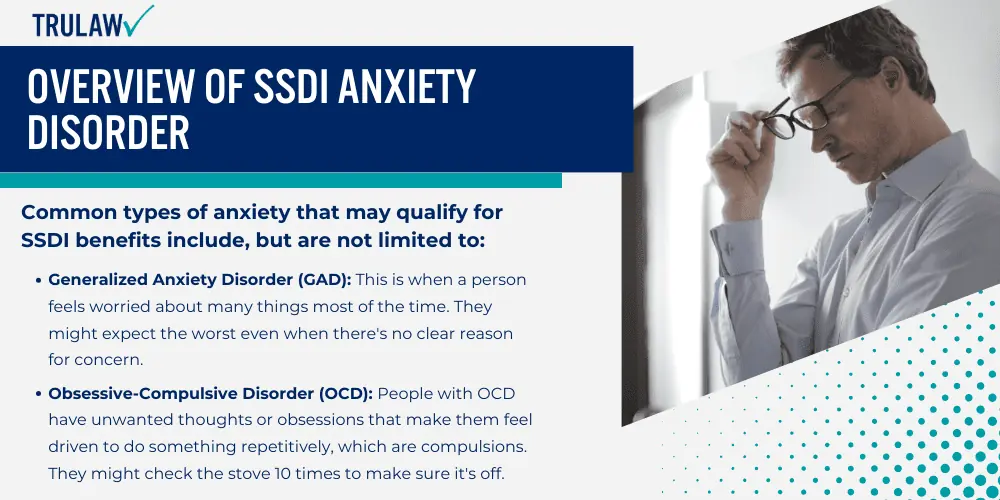
These disorders are recognized by the Social Security Administration (SSA) as potential grounds for disability benefits under Social Security Disability Insurance (SSDI), provided they meet certain stringent criteria.
Definition of SSDI Anxiety Disorder
Anxiety Disorder can make someone feel very scared, nervous, or worried even when there isn’t a big reason to feel that way.
These strong feelings of fear can happen all the time and can be so bad they make it hard for people to do everyday things like going to work or being with friends.
Doctors use special exams and questions to figure out if someone has Anxiety Disorder.
They check if the person’s symptoms match what’s listed in the Diagnostic and Statistical Manual of Mental Disorders (DSM-5).
This book helps doctors diagnose mental disorders by providing clear descriptions.
If anxiety stops someone from working for more than 12 months, they might get help from programs like Social Security Disability Insurance (SSDI), which offers disability benefits for long-term medical conditions.
Common Types of Anxiety
Anxiety comes in many shapes and forms.
It often makes everyday tasks feel overwhelming.
Common types of anxiety that may qualify for SSDI benefits include, but are not limited to:
- Generalized Anxiety Disorder (GAD): This is when a person feels worried about many things most of the time. They might expect the worst even when there’s no clear reason for concern.
- Obsessive-Compulsive Disorder (OCD): People with OCD have unwanted thoughts or obsessions that make them feel driven to do something repetitively, which are compulsions. They might check the stove 10 times to make sure it’s off.
- Panic Disorder: This one causes panic attacks—sudden feelings of terror when there is no real danger. Someone could have chest pain and think they’re having a heart attack, but it’s actually a panic attack.
- Phobias: A phobia is an extreme fear of something that poses little or no actual danger. Some people can’t be in small spaces or near spiders without feeling terrified.
- Social Anxiety Disorder: Also known as social phobia, this disorder involves overwhelming worry and self-consciousness about everyday social situations. A person might worry about being judged by others or embarrassing themselves.
- Post-Traumatic Stress Disorder (PTSD): After experiencing or seeing a traumatic event like war, abuse, or a disaster, someone with PTSD may have ongoing frightening thoughts and memories of their ordeal and feel emotionally numb.
Qualifying Criteria for SSDI Anxiety Benefits
To be eligible for SSDI benefits due to anxiety, individuals must meet specific criteria outlined by the Social Security Administration (SSA).
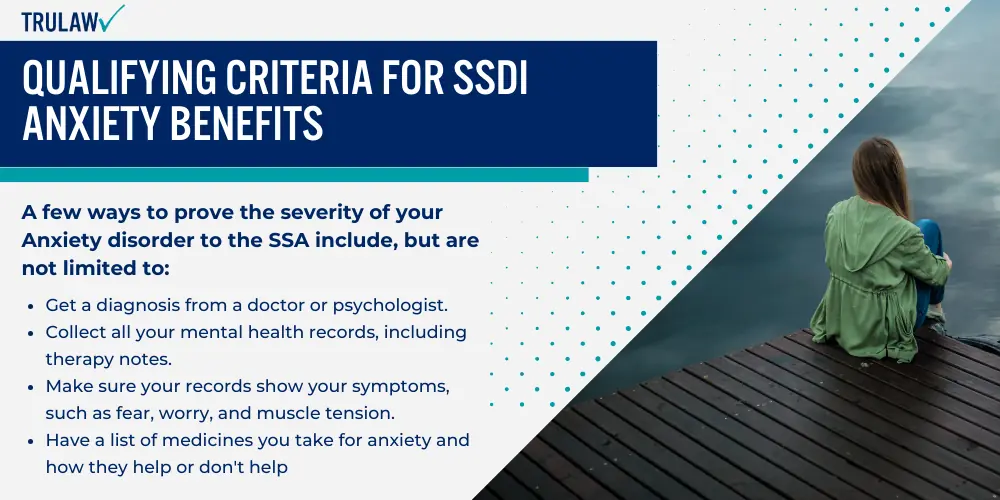
The evaluation of anxiety as a disability focuses on diagnosed mental disorders, assessment of mental functioning areas, and the severity of the symptoms related to anxiety.
Qualifying Mental Disorders
The SSA considers anxiety and obsessive-compulsive disorders under the umbrella of qualifying mental disorders for disability benefits.
To qualify for SSDI benefits for anxiety, the condition must be well documented with a clear diagnosis that aligns with the SSA’s listed impairments for mental disorders.
- Diagnosis: A formal diagnosis from a medical professional according to standard diagnostic protocols.
- Documentation: Detailed medical records that substantiate the diagnosis and include treatment history, response to treatment, and prognosis.
Areas of Mental Functioning
When evaluating disability benefits for anxiety, the SSA examines how the disorder affects four broad areas of mental functioning:
- Understand, remember, or apply information: This area looks at the ability to learn, recall, and apply information to perform work tasks.
- Interact with others: This area evaluates the capability to interact appropriately, effectively, and on a sustained basis with others.
- Concentrate, persist, or maintain pace: The focus is on the capacity to maintain concentration and attention for extended periods.
- Adapt or manage oneself: This encompasses the effectiveness of managing oneself regarding personal needs, setting realistic goals, and making plans independently of others.
Severity of Symptoms
The SSA requires evidence of either “marked” or “extreme” limitation in the above areas caused by anxiety symptoms.
- Marked limitation: This indicates a significant limit in functioning, with specifics documented by medical sources.
- Extreme limitation: A limitation that severely interferes with the ability to initiate, sustain, or complete activities, requiring substantial and extensive support.
To summarize, eligibility for SSDI benefits for anxiety hinges on a medically documented diagnosis within the listed impairments, a detailed examination of mental functioning in key areas, and the presence of severe anxiety with documented evidence of either marked or extreme limitation.
Documenting Anxiety Disorders
Medical evidence for SSDI claims should include detailed medical records that reflect a medically documented history of anxiety.
A few ways to prove the severity of your Anxiety disorder to the SSA include, but are not limited to:
- Get a diagnosis from a doctor or psychologist.
- Collect all your mental health records, including therapy notes.
- Make sure your records show your symptoms, such as fear, worry, and muscle tension.
- Have a list of medicines you take for anxiety and how they help or don’t help.
- Keep track of how long you’ve had anxiety—months or years matter.
- Record how anxiety affects daily life, like work, social stuff, and taking care of yourself.
- Note if you have other issues like post-traumatic stress disorder or obsessive-compulsive disorder too.
- Write down times when your anxiety got really bad in public or at home.
- Ask family or friends to write about what they see in your behavior because of anxiety.
- Add any test results that measure mental functioning, like concentrating or remembering things.
Severity and Long-term Impact of Anxiety
Having proof of an anxiety disorder is just the starting point.
The Social Security Administration looks at how bad your anxiety is and if it will last a long time.
Anxiety must really get in the way of your daily life and job for you to get help from SSDI.
For example, you might feel so scared or worried that you can’t do normal things like going to work or talking to people.
Medical records should list problems such as not being able to pay attention, sleep troubles, or feeling very restless to show this impact.
The SSA wants to see that these issues are severe and have been there for at least two years.
They check if you can handle changes in life or work routines without getting too stressed out.
If your anxiety stops you from doing basic tasks day after day, contact TruLaw using the chat on this page to receive an instant case evaluation for your SSDI Anxiety claim.
Application Process for Anxiety Disability Benefits
The journey toward securing SSDI for anxiety begins with gathering concrete proof of your condition and its impact on your daily life—this meticulous preparation is pivotal.
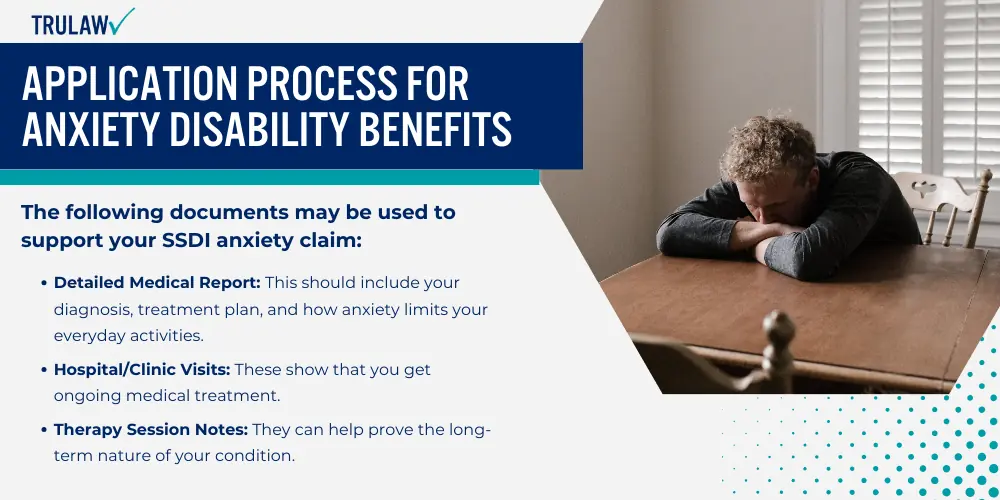
When submitting an application, detailed medical records and robust documentation are the cornerstones that support a claim’s validity.
Comprehensive Medical History
A full record of your medical history is key when applying for SSDI for anxiety.
This includes all your doctor’s visits, treatments, and any mental health therapy you’ve had.
Gather details like dates of appointments, types of treatment, names of medications, and reports from therapy sessions.
Your medical records should show how long you’ve been dealing with anxiety symptoms and how severe they are.
Make sure to include notes on how anxiety affects your daily life at work or home.
A detailed history helps prove that your condition is serious and has lasted a long time.
Documentation Requirements
To apply for SSDI benefits for anxiety, you need strong proof.
The following documents may be used to support your SSDI anxiety claim:
- Detailed Medical Report: This should include your diagnosis, treatment plan, and how anxiety limits your everyday activities.
- Hospital/Clinic Visits: These show that you get ongoing medical treatment.
- Therapy Session Notes: They can help prove the long-term nature of your condition.
- Character Statements: Friends or family can describe how anxiety impacts you daily.
- Psychological Test Results: These might include assessments by psychologists that confirm an extreme limitation in areas of mental functioning.
- Medication List: Some drugs might cause sleep disturbance or difficulty concentrating, which adds to the disability claim.
Challenges in Getting SSDI for Anxiety
Securing Social Security Disability Insurance (SSDI) for anxiety can often present hurdles—due to the subjective nature of the disorder and the stringent standards set by the Social Security Administration (SSA).
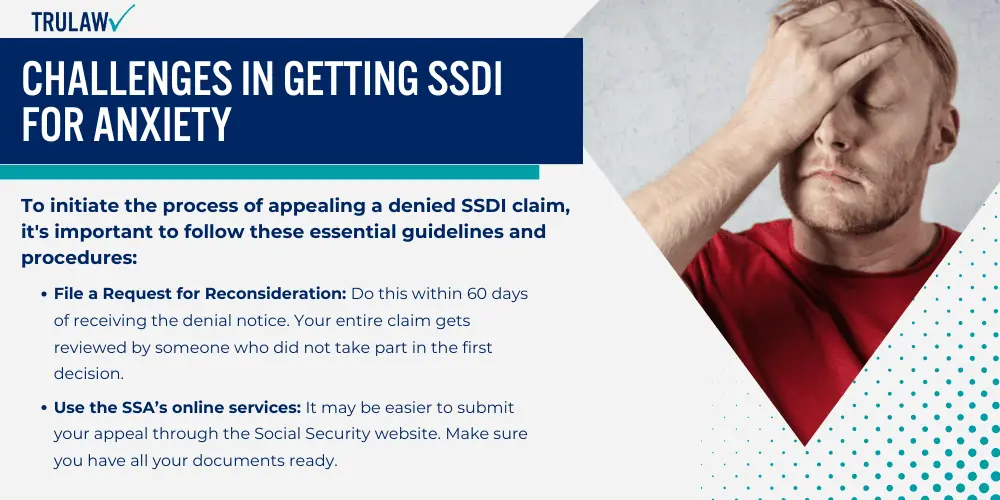
Applicants may face skepticism or misunderstandings about their condition, underlining the necessity for a robust case supported by compelling medical evidence.
Reasons for Denial
Many people who apply for SSDI get turned down the first time.
One big reason is lack of solid proof.
To win, you need strong medical evidence that shows your anxiety is bad and makes it hard for you to work.
Doctors’ reports must talk about how your condition meets specific rules set by the SSA.
Sometimes, even if you have good proof, the SSA might not think it’s enough.
They look for a “marked limitation” in daily activities, social stuff or focusing on tasks.
If they don’t see extreme limitations or lots of trouble across different parts of life, they may say no.
That’s why keeping track of all doctor visits and treatments is key – it can make or break your case.
How to Appeal a Denial
Getting your SSDI claim denied can be stressful.
To initiate the process of appealing a denied SSDI claim, it’s important to follow these essential guidelines and procedures:
- File a Request for Reconsideration: Do this within 60 days of receiving the denial notice. Your entire claim gets reviewed by someone who did not take part in the first decision.
- Use the SSA’s online services: It may be easier to submit your appeal through the Social Security website. Make sure you have all your documents ready.
- Gather More Evidence: Collect more medical records or get additional letters from doctors that explain your anxiety disorder and how it affects you daily.
- Write a Clear Explanation: Tell the SSA exactly why you disagree with their decision. Point out any mistakes or information they might have missed.
- Get a Consultative Exam if Needed: The SSA might ask you to see one of their doctors for more information about your condition.
- Check Over Your Application Again: Look at your original application for any errors or missing information that could have led to a denial.
- Seek Professional Help: Consider hiring an attorney who specializes in disability claims to help make your case stronger.
- Prepare for a Hearing if Necessary: If reconsideration doesn’t work, you can ask for a hearing with an administrative law judge who will look over your case again.
- Stay on Top of Deadlines: Missing deadlines can mean having to start over, so keep track of all dates and appointments related to your appeal.
- Keep Receiving Medical Treatment: Continue visiting your doctor and following their advice because recent medical evidence can help prove your claim of chronic anxiety.
Medical Evidence for SSDI Anxiety Claims
When applying for Social Security Disability Insurance (SSDI) due to an anxiety disorder, it’s critical to provide comprehensive medical evidence that substantiates the claim.
This evidence is the cornerstone of a successful SSDI claim, helping to establish the severity and impact of the anxiety disorder on the claimant’s ability to work.
Documenting Anxiety Disorders
Medical evidence for SSDI claims should include detailed medical records that reflect a medically documented history of anxiety.
These records are pivotal in demonstrating both the existence and extent of the disorder.
The following medical documentation may be required in a SSDI anxiety benefits:
- Objective medical evidence, such as psychological tests, that confirms the diagnosis of anxiety.
- Reports from ongoing medical treatment sessions, illustrating consistent efforts to manage the disorder.
- Detailed statements from treating physicians outlining specific symptoms, treatment plans, and the effectiveness of the treatments provided.
Medically Documented History
Maintaining a medically documented history is vital for an SSDI anxiety claim.
This history should show:
- A clear onset date of the anxiety disorder.
- The progression of the disorder despite receiving ongoing medical treatment.
- The claimant’s responsiveness to treatment, or lack thereof, and the long-term prognosis.
From an SSDI perspective, the claimant’s medical treatment history helps to paint a picture of the anxiety disorder’s impact on their daily functioning and ability to sustain employment.
It is important that this history is thorough and up-to-date, reflecting the continuous nature of the claimant’s condition and treatment efforts.
Veterans and Disability Benefits for Anxiety
Veterans facing anxiety disorders may find solace in the fact that disability benefits are within reach under certain conditions.
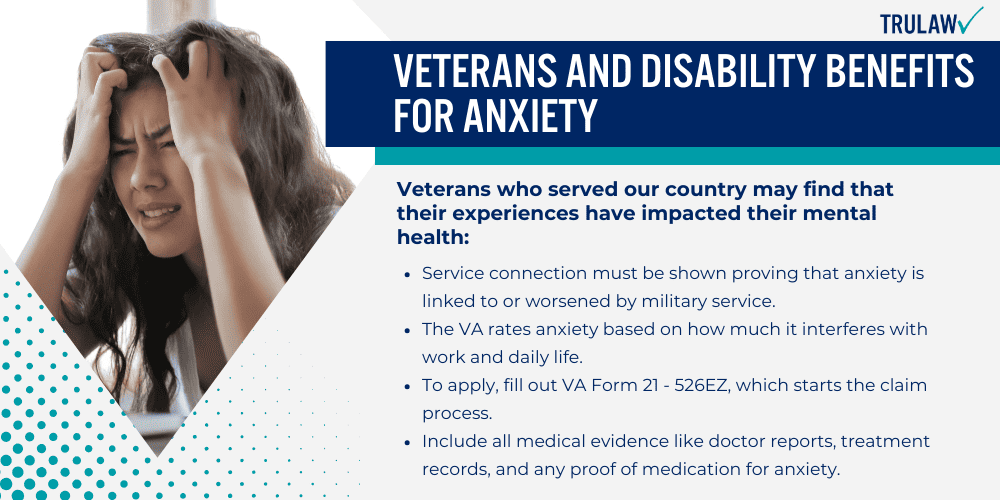
The intricate process tailored for veterans involves proving eligibility through service connection, medical evidence, and aligning with specific VA criteria.
Eligibility and Application Process
Eligibility for disability benefits due to anxiety is a serious matter.
Veterans who served our country may find that their experiences have impacted their mental health:
- Service connection must be shown. This means proving that anxiety is linked to or worsened by military service.
- The VA rates anxiety based on how much it interferes with work and daily life. Ratings go from 0% to 100%, with higher ratings for more severe cases.
- To apply, fill out VA Form 21 – 526EZ, which starts the claim process.
- Include all medical evidence like doctor reports, treatment records, and any proof of medication for anxiety.
If you or a loved one are filing an SSDI application or appeal, contact TruLaw today using the chat on this page to receive an instant case evaluation.
Discover how the SSDI Lawyers within TruLaw’s legal network can help you today.
TruLaw #1 SSDI Anxiety Lawyer
When it comes to navigating the complex world of Social Security Disability Insurance (SSDI), having a knowledgeable lawyer by your side can make all the difference.
If you’re dealing with anxiety that impairs your ability to work, TruLaw is here to help.
Our extensive legal network understands the challenges you face and has the expertise to guide you through the SSDI application process.
Reasons to chose TruLaw, a personal injury firm that understands SSDI anxiety benefits:
- Expertise in Mental Health Claims: Our specialization in mental health issues, including anxiety, ensures that your case is handled with the necessary knowledge and sensitivity.
- Personalized Attention: We recognize the uniqueness of your situation and dedicate ourselves to providing the personalized attention your case requires.
- Proven Track Record: Our years of experience come with a history of successful claims, affirming our capability to effectively manage and win your case.
- No Upfront Fees: We believe in making legal assistance accessible, offering our services on a contingency basis—you won’t pay unless we win your case.
- Ease of Communication: Keeping you informed every step of the way is our priority. Contact TruLaw today using the chat on this page to receive an instant case evaluation.
If you or a loved one are filing an SSDI application or appeal, contact TruLaw today using the chat on this page to receive an instant case evaluation.
Discover how the SSDI Lawyers within TruLaw’s legal network can help you today.
Social Security Disability Insurance Frequently Asked Questions
-
What is the Role of a Mental Disorder in SSDI Anxiety Claims?
When applying for Social Security Disability Insurance (SSDI) due to anxiety, the classification of the condition as a mental disorder is crucial.
The Social Security Administration (SSA) recognizes various mental disorders, including anxiety, as potentially disabling conditions under its Listing of Impairments.
To qualify for SSDI, the anxiety disorder must significantly impair your ability to perform basic work activities and meet specific criteria outlined by the SSA, including persistent anxiety, apprehension, or fear.
-
How Important are Physical Symptoms in an SSDI Anxiety Claim?
Physical symptoms play a significant role in the evaluation of an SSDI claim for anxiety.
These symptoms, which may include muscle tension, fatigue, or gastrointestinal issues, are critical in demonstrating the severity and impact of the anxiety disorder.
The SSA examines the physical manifestations of the disorder to determine its effect on an individual’s ability to perform daily tasks and maintain employment.
-
Why Should I Consider a Disability Lawyer for My SSDI Anxiety Claim?
Consulting with a personal injury lawyer at TruLaw can be vital in navigating the complexities of an SSDI claim for anxiety.
TruLaw can help you interpret the SSDI regulations and can assist in gathering and presenting necessary medical evidence, completing paperwork, and guiding you through the appeals process if your initial claim is denied.
Their expertise improves your chances of a successful claim, as they understand the specific requirements and evidence needed to prove the severity of your anxiety disorder.
-
What is the Significance of a Medically Documented History in an SSDI Claim for Anxiety?
A medically documented history is essential for an SSDI claim for anxiety.
This history should include detailed records from mental health services, indicating consistent treatment and the severity of the disorder.
The SSA evaluates this documentation to understand the long-term effects of the anxiety on your ability to work.
If you or a loved one are filing an SSDI application or appeal, contact TruLaw today using the chat on this page to receive an instant case evaluation.
Discover how the SSDI Lawyers within TruLaw’s legal network can help you today.

Managing Attorney & Owner
With over 25 years of legal experience, Jessica Paluch-Hoerman is an Illinois lawyer, a CPA, and a mother of three. She spent the first decade of her career working as an international tax attorney at Deloitte.
In 2009, Jessie co-founded her own law firm with her husband – which has scaled to over 30 employees since its conception.
In 2016, Jessie founded TruLaw, which allows her to collaborate with attorneys and legal experts across the United States on a daily basis. This hypervaluable network of experts is what enables her to share the most reliable, accurate, and up-to-date legal information with our readers!
Additional Social Security Disability Insurance resources on our website:
Here, at TruLaw, we’re committed to helping victims get the justice they deserve.
Alongside our partner law firms, we have successfully collected over $3 Billion in verdicts and settlements on behalf of injured individuals.
Would you like our help?
At TruLaw, we fiercely combat corporations that endanger individuals’ well-being. If you’ve suffered injuries and believe these well-funded entities should be held accountable, we’re here for you.
With TruLaw, you gain access to successful and seasoned lawyers who maximize your chances of success. Our lawyers invest in you—they do not receive a dime until your lawsuit reaches a successful resolution!
AFFF Lawsuit claims are being filed against manufacturers of aqueous film-forming foam (AFFF), commonly used in firefighting.
Claims allege that companies such as 3M, DuPont, and Tyco Fire Products failed to adequately warn users about the potential dangers of AFFF exposure — including increased risks of various cancers and diseases.
Depo Provera Lawsuit claims are being filed by individuals who allege they developed meningioma (a type of brain tumor) after receiving Depo-Provera birth control injections.
A 2024 study found that women using Depo-Provera for at least 1 year are five times more likely to develop meningioma brain tumors compared to those not using the drug.
Suboxone Tooth Decay Lawsuit claims are being filed against Indivior, the manufacturer of Suboxone, a medication used to treat opioid addiction.
Claims allege that Indivior failed to adequately warn users about the potential dangers of severe tooth decay and dental injuries associated with Suboxone’s sublingual film version.
Social Media Harm Lawsuits are being filed against social media companies for allegedly causing mental health issues in children and teens.
Claims allege that companies like Meta, Google, ByteDance, and Snap designed addictive platforms that led to anxiety, depression, and other mental health issues without adequately warning users or parents.
Transvaginal Mesh Lawsuits are being filed against manufacturers of transvaginal mesh products used to treat pelvic organ prolapse (POP) and stress urinary incontinence (SUI).
Claims allege that companies like Ethicon, C.R. Bard, and Boston Scientific failed to adequately warn about potential dangers — including erosion, pain, and infection.
Bair Hugger Warming Blanket Lawsuits involve claims against 3M — alleging their surgical warming blankets caused severe infections and complications (particularly in hip and knee replacement surgeries).
Plaintiffs claim 3M failed to warn about potential risks — despite knowing about increased risk of deep joint infections since 2011.
Baby Formula NEC Lawsuit claims are being filed against manufacturers of cow’s milk-based baby formula products.
Claims allege that companies like Abbott Laboratories (Similac) and Mead Johnson & Company (Enfamil) failed to warn about the increased risk of necrotizing enterocolitis (NEC) in premature infants.
Here, at TruLaw, we’re committed to helping victims get the justice they deserve.
Alongside our partner law firms, we have successfully collected over $3 Billion in verdicts and settlements on behalf of injured individuals.
Would you like our help?

